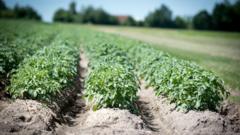Can This App Solve the £3.5bn Potato Crisis for Farmers?

Revolutionizing Agriculture: AI-Powered App to Combat Potato Late Blight
In an era where technology meets agriculture, researchers at Aberystwyth University are pioneering an innovative application designed to assist farmers in detecting late blight, a fungal disease that poses significant risks to potato crops. This groundbreaking app harnesses the power of artificial intelligence (AI) to provide early warnings, enabling farmers to take preventive measures before the disease manifests visibly. With potato crops accounting for a substantial percentage of agricultural output, the development of this app could revolutionize the way farmers manage their fields and safeguard their livelihoods.
The Impact of Late Blight on Potato Cultivation
Late blight is not just an agricultural inconvenience; it is a formidable foe that leads to approximately 20% of potato crop losses worldwide. Economically, this translates to staggering losses estimated at £3.5 billion annually. The disease thrives under specific environmental conditions, making it a persistent threat to farmers who cultivate potatoes. In regions like Wales, where over 17,000 hectares are dedicated to potato farming, the implications of this disease are profound, impacting both local economies and global food security.
AI and Machine Learning: A Game Changer for Farmers
The DeepDetect project aims to leverage machine learning to offer accurate, location-specific diagnoses of late blight directly to farmers via their smartphones. By using a combination of image datasets that distinguish between healthy and diseased potato leaves, the researchers intend to create an AI-powered prototype that can effectively identify the disease at its nascent stages. This innovative approach not only promises to enhance productivity but also reduces the financial burden associated with preventive measures, which currently cost Welsh farmers up to £5.27 million annually.
Benefits of Early Detection
Early diagnosis of late blight can yield multiple benefits for farmers:
- Improved Crop Yields: Detecting the disease early allows for timely intervention, thus maximizing crop yields.
- Cost Reduction: By minimizing losses, farmers can significantly cut down on their operational costs.
- Environmental Sustainability: Early detection can lead to a decreased reliance on harmful pesticides, promoting a healthier ecosystem.
- Enhanced Food Security: Ensuring optimal potato production is crucial for feeding the growing global population.
Farmers’ Feedback: A Key Component
Edore Akpokodje, a computer science lecturer at Aberystwyth University, emphasizes the importance of integrating farmer feedback into the app’s development. By grounding the technology in the real-world challenges faced by farmers, the research team aims to create a practical tool that meets the specific needs of its users. This collaborative approach not only fosters trust but also ensures that the app remains relevant and effective in the field.
A Broader Vision: Beyond Potatoes
While the immediate focus of the DeepDetect project is on potatoes, the potential applications of this technology extend far beyond this staple crop. The methodologies developed during this project could be adapted for other crops that are susceptible to various diseases. By creating a national early warning system for potato blight, researchers envision a scalable model that can be replicated across different agricultural sectors, providing invaluable support to farmers worldwide.
The Significance of Potatoes in Global Agriculture
Potatoes hold a vital place in the global food supply chain. As the fourth most important staple crop worldwide, they play an essential role in nutrition and food security. With the growing global population and increasing food demand, ensuring the optimal production of potatoes is more crucial than ever. The implications of potato blight are not just limited to farmers; they reverberate throughout the entire food system, affecting consumers and economies alike.
Conclusion: A Step Towards Sustainable Farming
The development of an AI-powered app to combat late blight represents a significant step forward in sustainable agriculture. By enabling early detection, farmers can enhance their productivity while reducing their environmental impact. This project not only addresses the immediate challenges posed by potato blight but also sets the stage for a future where technology and agriculture work hand in hand to ensure food security for generations to come.
FAQs
What is late blight and why is it a problem for potato farmers?
Late blight is a fungal disease that affects potato crops, leading to significant crop losses and economic damage. It thrives under specific environmental conditions and can devastate entire fields if not detected early.
How does the AI app help in detecting late blight?
The AI app uses machine learning algorithms trained on image datasets of healthy and diseased potato leaves to provide farmers with accurate, location-specific diagnoses of late blight through their smartphones.
What benefits can farmers expect from early detection of late blight?
Farmers can expect improved crop yields, reduced operational costs, decreased reliance on harmful pesticides, and enhanced food security through early detection of late blight.
Can this technology be applied to other crops?
Yes, while the current focus is on potatoes, the methodologies developed during the DeepDetect project have the potential for wider application across other crops that face similar disease challenges.
As researchers continue to push the boundaries of agricultural technology, one must consider: how will innovations like these shape the future of farming and food security? #AgricultureTech #SustainableFarming #FoodSecurity
Published: 2025-07-22 09:15:07 | Category: wales



